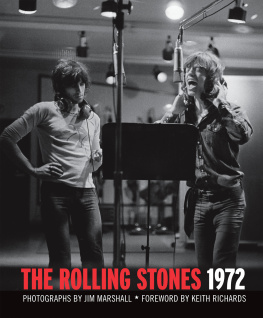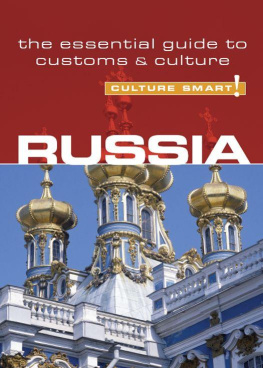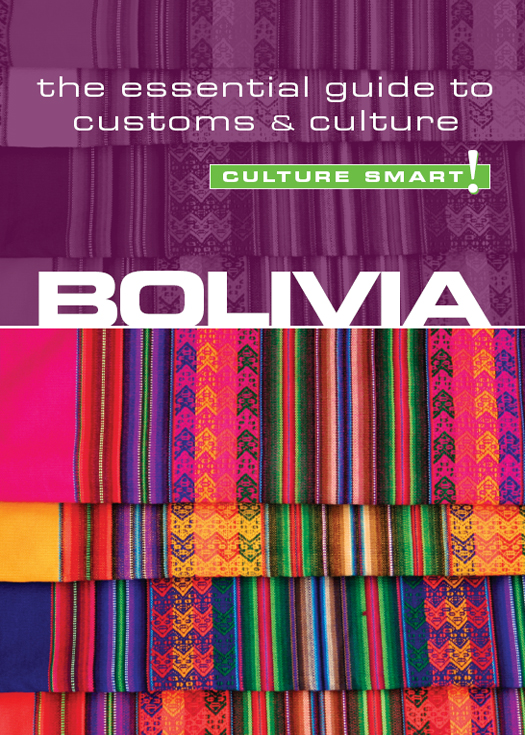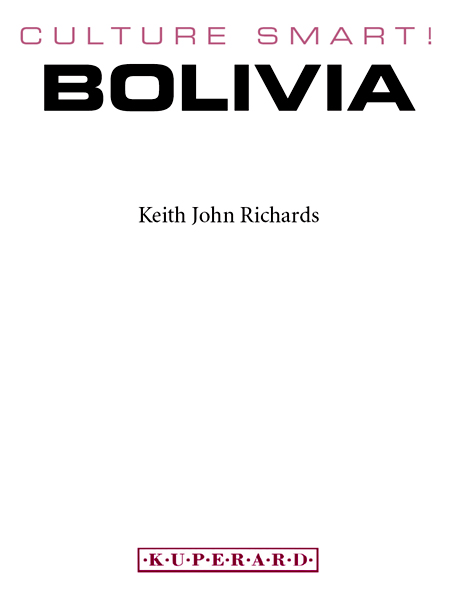First published in Great Britain 2009
by Kuperard, an imprint of Bravo Ltd
59 Hutton Grove, London N12 8DS
Tel: +44 (0) 20 8446 2440 Fax: +44 (0) 20 8446 2441
www.culturesmart.co.uk
Inquiries:
Culture Smart! is a registered trademark of Bravo Ltd
Copyright 2009 Kuperard
All rights reserved. No part of this publication may be reprinted or reproduced, stored in a retrieval system, or transmitted in any form or by any means without prior permission in writing from the publishers.
Series Editor Geoffrey Chesler
eISBN: 978-1-85733-623-8
British Library Cataloguing in Publication Data
A CIP catalogue entry for this book is available from the British Library
The photographs on are reproduced by permission of the author.
Images on the following pages reproduced under Creative Commons License Attribution 2.5: gaelj/fotolia
v3.1
About the Author
KEITH JOHN RICHARDS was born in London in 1953. He has lived in Italy, Peru, Costa Rica, and the United States, as well as Bolivia. He received his Ph.D. in 1994 from Kings College, University of London, for a thesis on the Bolivian novelist and historian Nstor Taboada Tern, which was published in 1999 as Lo imaginario mestizo (The Mestizo Imaginary). His critical bilingual anthology, Narrative from Tropical Bolivia, was published in 2004.
Keith Richards has taught Latin American film, literature, and popular culture at universities in Britain, the USA, and Bolivia. He has published widely on all these subjects and co-organized Latin American film symposia and festivals at the universities of Leeds (UK) and Richmond (Virginia). He has lived in La Paz, Bolivia, since 2005 and divides his time between teaching at the Universidad Mayor de San Andrs and writing; he is currently preparing a book on Latin American cinema.
The Culture Smart! series is continuing to expand.
For further information and latest titles visit
www.culturesmart.co.uk
The publishers would like to thank CultureSmart!Consulting for its help in researching and developing the concept for this series.
CultureSmart!Consulting creates tailor-made seminars and consultancy programs to meet a wide range of corporate, public-sector, and individual needs. Whether delivering courses on multicultural team building in the USA, preparing Chinese engineers for a posting in Europe, training call-center staff in India, or raising the awareness of police forces to the needs of diverse ethnic communities, it provides essential, practical, and powerful skills worldwide to an increasingly international workforce.
For details, visit www.culturesmartconsulting.com
CultureSmart!Consulting and CultureSmart! guides have both contributed to and featured regularly in the weekly travel program Fast Track on BBC World TV.
contents
Map of Bolivia
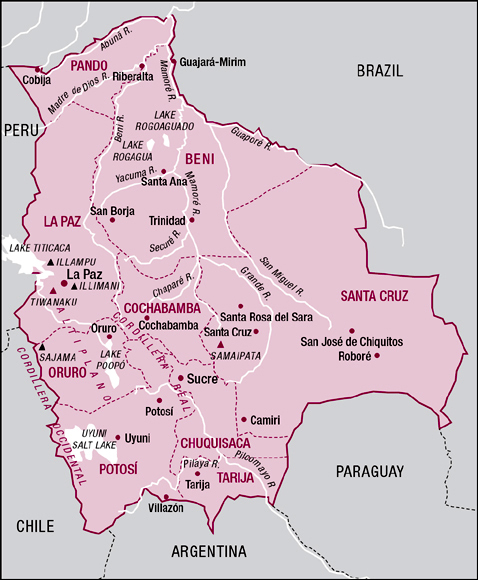
introduction
Bolivia is unique. For more than a century it has lacked a coastline, and few of its border regions differ in topography from its neighbors; the traveler passes into Chile and is still on the Altiplano, or enters Peru without losing sight of Lake Titicaca. Yet however capricious and arbitrary its borders may be, they help create a national psycheif a divided one, with regional as well as national identities.
Part of Bolivias uniqueness comes from the isolation that resulted from its becoming landlocked in the late nineteenth century, but its remoteness was evident even earlier. Even at its inception, it had only a tiny sea outlet in relation to its vast interior. It is through the process of emerging from isolation into dialogue with the rest of the world that some fascinating cultural and social changes are now occurring.
The stereotypical tourist image of Aymara women in bowler hats against a backdrop of snowy peaks is a constant source of frustration for the inhabitants of the lowlands and valleys, and is an indication that Bolivias diversity is, even now, inadequately acknowledged. Bolivians are a mix of idiosyncrasies and inconsistencies: by turns open and inscrutable, generous with foreigners and tough with compatriots, self-abnegating and fiercely proud, stoical, and volatile. But warts are outweighed by virtues, and overall visitors find them good-humored, sociable, and welcoming. Despite their strong regionalism, they have more common interests than reasons to fight.
Bolivia is at a crossroads today. It has to find a way to become part of the modern world without surrendering its individuality, guaranteeing its peoples growth and welfare while ensuring genuine benefits from its enormous natural wealth. It needs at last to cope with the regionalism that resists unification. It must learn to live with the vestiges of colonialism and banish the assumptions of racial inferiority that even today oppress the countrys Indian majority.
Pessimistic observers see an innate capacity for self-destruction among Bolivians and point to repeated regional and ethnic conflict, but it should be remembered that this young nation contains oppressed minorities, some physically remote from the ruling elites, and others whose humanity is only now being acknowledged. These disparate elements have only recently begun to come into true contact. The demise of the Bolivian state, like the death of Mark Twain, has been grossly exaggeratedprophets of doom have underestimated the resilience of the people, their long experience of hardship, and their determination to overcome difficulties. What cannot be underestimated is their goodwill!Bienvenidos a Bolivia! Welcome to Bolivia.
Key Facts
| Official Name | Repblica de Bolivia |
| Capital Cities | La Paz (seat of government); Sucre (official capital and seat of the judiciary) |
| Main Cities | Santa Cruz (pop. 1,538,343); La Paz (pop. 839,905); El Alto (pop. 896,773); Cochabamba (pop. 603,342); Oruro (pop. 232,246) |
| Area | 424,164 sq. miles (1,098,581 sq. km) |
| Terrain | Enormously varied landscape, including the Altiplano, or high plateau, in the west (at an average of 12,500 ft, or approx. 3,800 m); tropical rain forest in the east; subtropical valleys around Cochabamba and the Yungas forests north of La Paz |
| Climate | Extremely varied: in west, dry and cold; hot and humid in the east | Altitude ranges from 21,463 ft (6,542 m) above sea level (Sajama) to 295 ft (90 m) (Ro Paraguay). |
| Currency | Boliviano, or peso (100 centavos) |
| Population | 9,247,816 (July 2008) |
| Life Expectancy | 66.5 years |
| Adult Literacy Rate | 88.4% |
| Ethnic Makeup | Quechua (30%), Mestizo (30%), Aymara (25%), European (15%) |
| Official Languages | Spanish, Quechua, Aymara, Guaran Some 30 other indigenous languages are considered co-official. |




